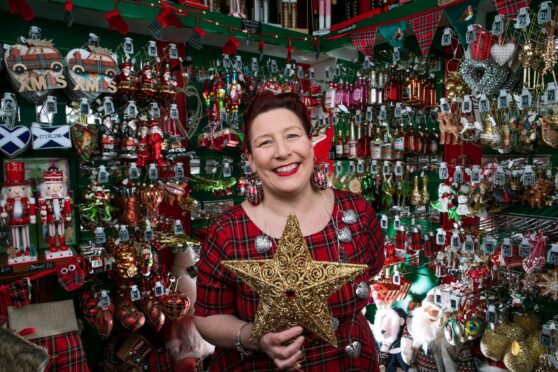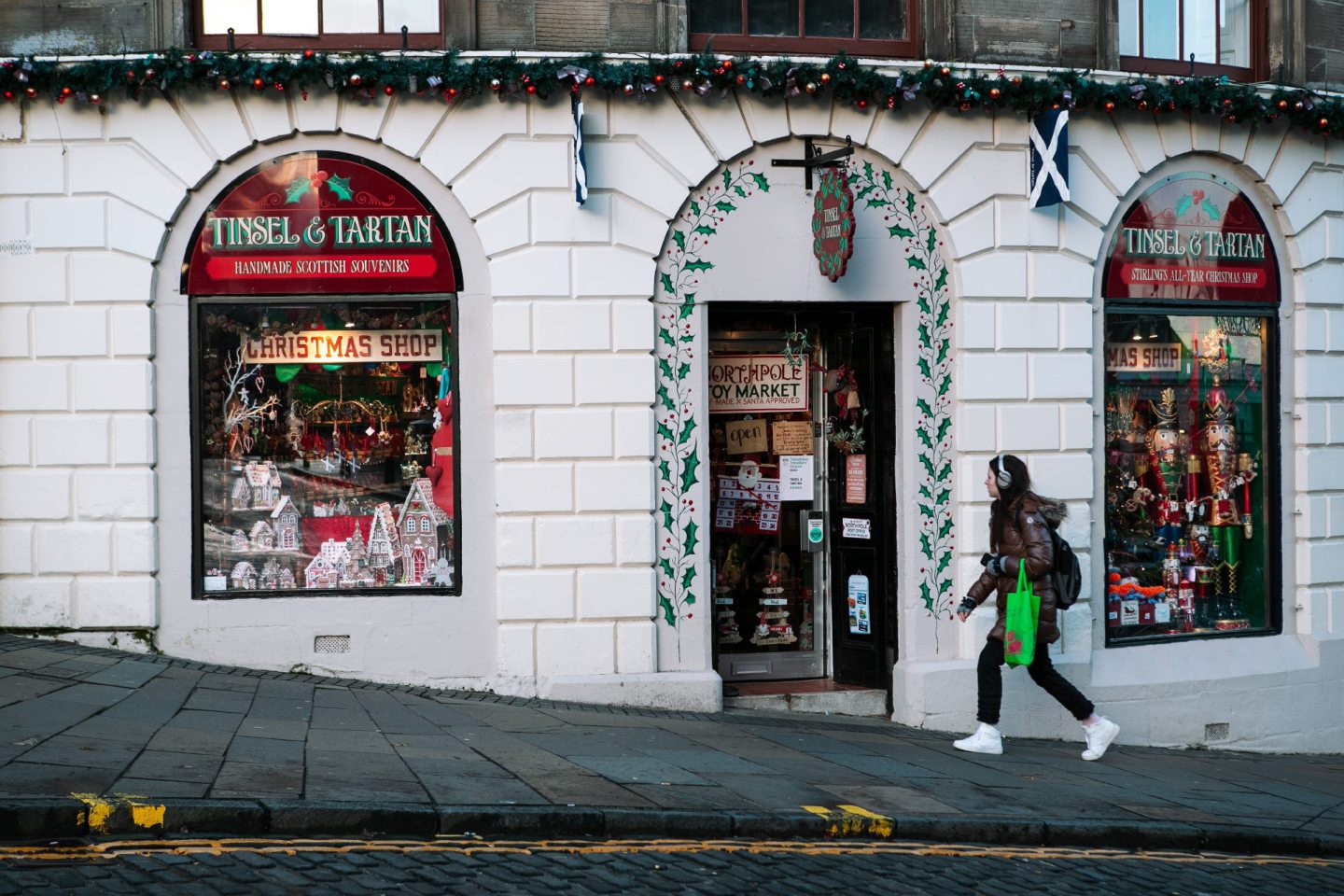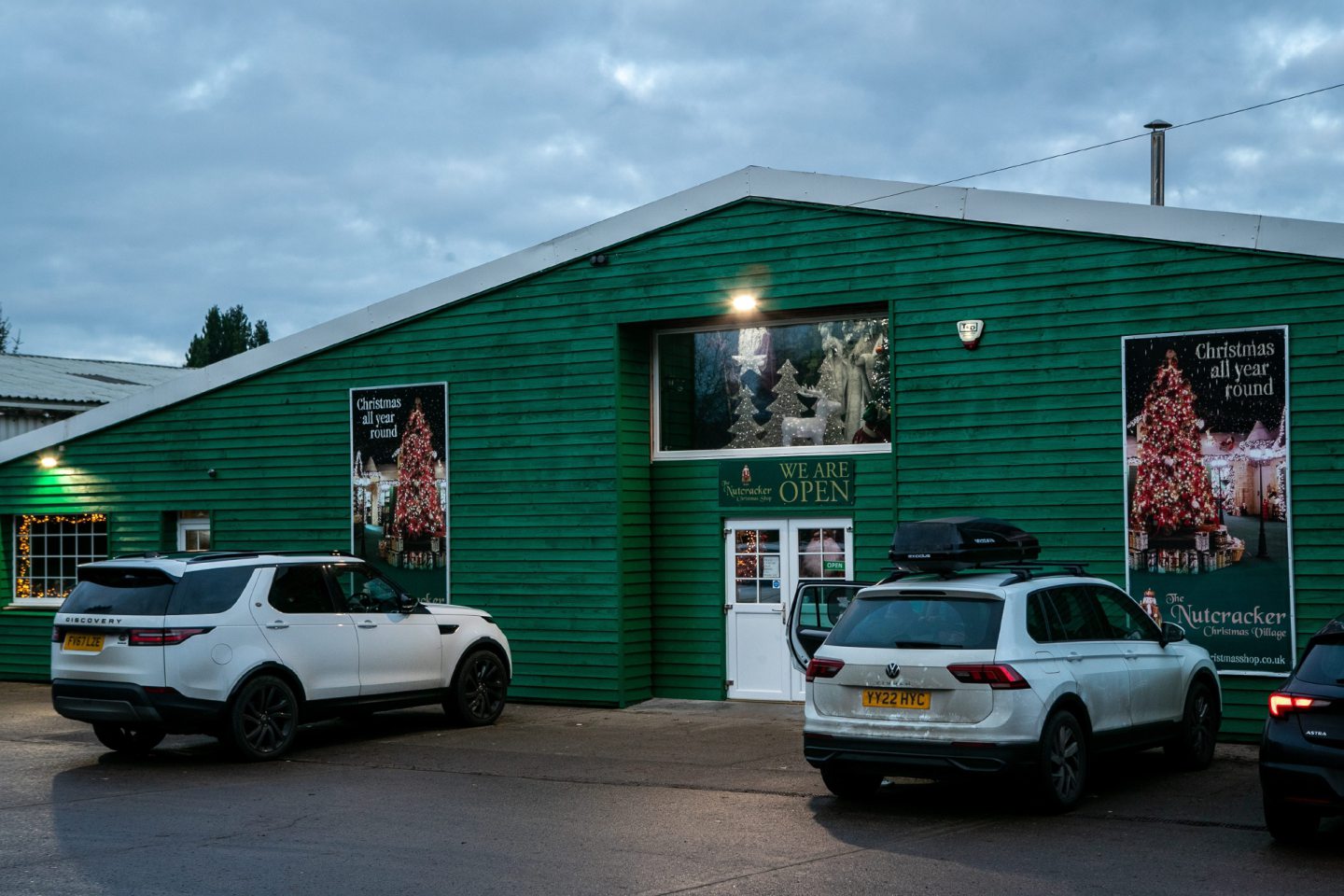
For Lyndsey McDermott nearly every day is Christmas Day. For 11 months a year (she takes January off) she can be found in her shop, Tinsel & Tartan, surrounded by baubles, gingerbread houses, nativity sets and Santas big and small.
Monday to Sunday, from 10 in the morning until five in the evening, she warmly welcomes customers into her cosy store that sits on the corner of Spittal Street in Stirling, underneath a statue of a William Wallace. “Some nights I can still be pottering around here at seven or eight o’clock,” she says. “It’s not that I’m desperate to get away.”
When, you have to wonder, does she get any shopping done? “I do Hello Fresh. It gets delivered.”
It is mid-November when we speak. “Do you know it’s 40 days to Christmas?” McDermott asks a mother and daughter who are browsing this Tuesday morning. The daughter is looking for a bauble to take back to New Zealand as a keepsake of her trip.
McDermott, 47, is decked out in a tartan dress and has a deep love of the festive season. Three years ago she decided to leave a career in finance and set up her own Scottish-flavoured Christmas wonderland where she now spends most days. From February to closing time on Christmas Eve she can usually be found in this little shop, a Christmas haven all year round.
Formerly a florist’s, Tinsel & Tartan opened in its current location in 2020 (for a year the shop had been in a nearby arcade). It is home to church candles, nativity sets, advent cards, and felt baubles that look like the late Queen, Van Gogh, Shakespeare and Nessie.
On McDermott’s Scotland wall there are kilted Santas, bagpipe-playing Santas and tartan stars for the tree. There’s even a Christmas Tyrannosaurus Rex. Because why wouldn’t there be? And we haven’t mentioned the gingerbread houses or the snowglobes or the sachets of Christmas fragrance.
“I like this one,” she says, lifting one called Blue Door to her nose. “Smells of handsome men.”
In the background music plays quietly. Her own 1940s playlist. “I only play Christmas music in December,” she points out.
Looking around, she tries to sum up the space she has created. “I’ve tried to make it olde worlde. Like walking into someone’s…Well, if you walked into someone’s living room and it looked like this you’d get a fright,” she admits, laughing.
Christmas and commerce have been bedfellows since the late 19th Century and the rise of the department store. But the bespoke Christmas shop is a more recent development, an import from the United States.
When Robert Newman opened his first Christmas shop in Callander in 2001 he estimates there were just the seven Christmas shops in the whole of the UK.
There are a few more now. And Newman runs four of them; the original shop in Callander, another in Edinburgh, one in Stratford-upon-Avon and a large former warehouse on the outskirts of Crieff that is now a Christmas wonderland, decked out with more festive decorations than you’d see in a month of Netflix Christmas movies. Ask him how many items of stock he carries in the Crieff shop and he’ll tell you more than 5,000.
Those items are divided by theme and by colour. “We’ve themed it a little bit,” he tells me as he walks me around on the last Monday in November.
“Reds in here,” he says in one room. “This one is mostly Victorian,” he continues in the next.
Newman fusses over empty spaces on the shelves, adjusting and correcting as he goes along, his retailer’s eye always at work. “There’s blank spaces,” he fusses. “I don’t like blank spaces.”
In the room dedicated to nativity sets he reorders figures in each manger. “Mary is not going to be sitting looking at her bairn like that,” he points out.
“Believe it or not this is the poorest value for money,” he says of his nativity room. “We sell less of it. And this little character here,” Newman says, picking up a baby Jesus, “is the one everyone wants to steal.”
Newman is, quite frankly, a force of nature. At 74 he is a human dynamo full of cheek and cheer. The day before we meet, he tells me, he worked a 21-hour day. “I’ve got the passion and I put that passion over to my customers,” he says. “I ask them everything and I tease them. I’ve got a good rapport with my customers.”
Nutcracker is a family business. Newman’s wife Shirley, their two daughters Alison and Jacqueline and his grandsons Dean and Aden are all involved. But spend any time with them and it is clear that Newman is the fulcrum. He has no notion of retiring. “If somebody comes in and finds me lying on the floor I’ll be fine,” he says. “As long as I’m not out in the cold and the wet.”
Of course, for many of us Christmas only happens on the last page of the calendar. The season arrives in a frantic last-minute rush of present buying and frantic preparation.
It’s not something we think about when the sun is splitting the sky. But is that the same for everyone? Does a Christmas Shop have customers in spring and summer? Yes, is the answer.
“Last year my summer sales were on a par with winter,” McDermott explains. “A lot of people say you’ll get busy now. And it is. But I think the thing people forget is other shops are doing Christmas at Christmas time, so it gets spread out.
“But at Easter or summer time, for people who want a Christmas bauble souvenir, it’s a massive thing.
“Hundreds of people tell me this every year. Hundreds. ‘Everywhere we go we collect something.’ And they all think they’re the only ones. And thankfully they’re not because that’s my bread and butter.”
In Stirling she caters to tourists and locals. “People contact me from Canada, Australia, the States, because there are Facebook pages that are all about planning your trip,” she says.
“And people who have been here say, ‘You must go to Tinsel & Tartan’. It’s so flattering.”
But Christmas businesses are as prone to the same issues as any other. McDermott admits that Covid was an existential crisis for her business.
“Absolutely. If I hadn’t moved out of that arcade I would never have survived. I know that in my heart.” And this year Christmas is being squeezed by the cost of living crisis.
“We’re holding our own,” Newman tells me. “We’ve kept building up our stock so if nobody comes in in January we’ll have a bit of money and we don’t have to replace stock at that point.
“And we’re always picking up new customers. Someone came in recently and spent £1,700 on Christmas. But I’m as happy if somebody walks in and buys one ornament.”
There’s another question to be asked. The only question, maybe. Why, in the dog days of February or the blazing days of July would you choose to immerse yourself in Christmas? Does Newman ever get tired of the festive season?
“Nooo!” he exclaims, horrified. “That’s a terrible thing to say. I love doing what I’m doing. It’s in my belly, it’s in my heart.”
But why? “For me it’s a total passion,” he explains. “My mother and father split up and my mother remarried a German when I was seven. I don’t remember a Christmas before that first Christmas with that German. I don’t remember any of it.
“But if you said to me you’ve got to tell me everything you saw in that room that first Christmas morning I can tell you all of it. I can tell you where the big paper decoration balls and bells were, what was in the window, the tree. I can smell the tree.
“And I remember that first Christmas morning with a new dad – who I didn’t get on with later on but that’s not the point – running downstairs and there was this great roasting fire on, the tree was in the window, the candles were lit on the tree and my mother and stepfather were in their bed. Obviously they had woken me up and jumped back into their bed. And I ran downstairs and I was speechless.
“My actual dad was a drunk. He wasn’t a real father, he just drank all the money. He worked in the pits and he just drank,” he says in passing.
But it’s the memory of that Christmas when he was seven that lights up his eyes. “It’s in here,” he says, tapping his chest.
“Christmas is magical when you’re a child,” McDermott agrees, “but for me it became magical when I had my son Seany. It’s not my own childhood I think back to, it’s his. And it was all about making it magic for him.”
But part of that is because Christmas in her own childhood wasn’t magical. Her parents weren’t together and she was brought up by her mum who was a single parent. “We never had a penny at Christmas. And when you go back to school and all your friends have got Sindy Dreamhouse and you’ve got something practical you wonder why.
“So I think when I had my son it went the other way. But on the other hand he was never spoiled insanely.
“It’s not about the money. That doesn’t show how much you care. It’s the thought. But I kind of overdo it. I can’t help it.”
Is this all about childhood then? “I don’t know, but I think it is.”
Newman is convinced it is. “I’m going to show you one thing and I think this is why it’s deep inside,” he tells me as we go through a door into the staff area.
There, on top of a mountain of cardboard boxes he shows me the Christmas present his German stepfather Willie made him for his seventh Christmas. A little fort. The colours are faded, there are pieces missing, but 67 years after it was made Newman still has it.
“He made it all out of secondhand wood,” he says. “You can see the wee staples he put in it. And look at this. Look at the bars in the jail.”He lovingly runs his hands over it.
“And it’s a nothing. It’s a scabby piece of wood that every kid would walk past nowadays but I can’t. So I’ve told them they can undo it and put it in my box. The girls know that’s what I would want.”
For a moment I can see the seven-year-old he once was. And maybe there’s the answer. Christmas is indeed all about childhood, whether you’re four, seven, 47 or 74.

Enjoy the convenience of having The Sunday Post delivered as a digital ePaper straight to your smartphone, tablet or computer.
Subscribe for only £5.49 a month and enjoy all the benefits of the printed paper as a digital replica.
Subscribe © Andrew Cawley
© Andrew Cawley © Andrew Cawley
© Andrew Cawley © Andrew Cawley
© Andrew Cawley